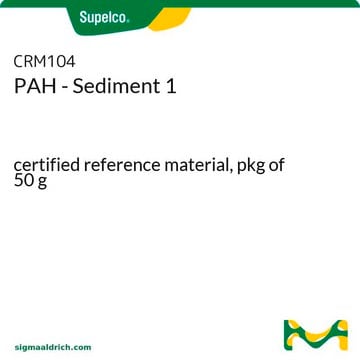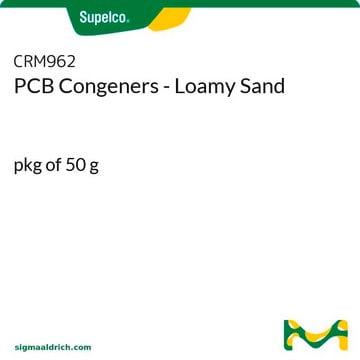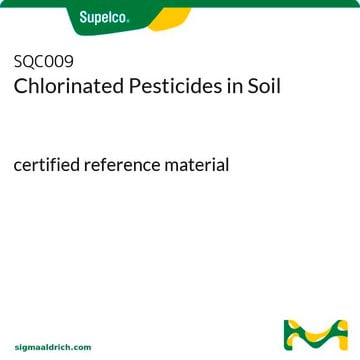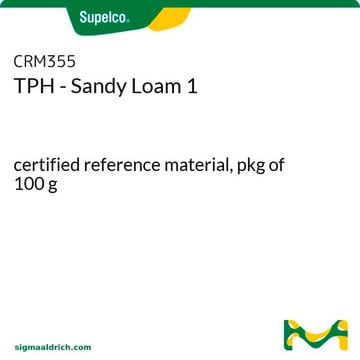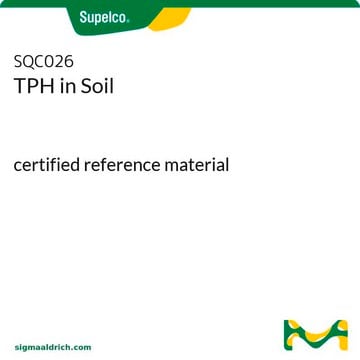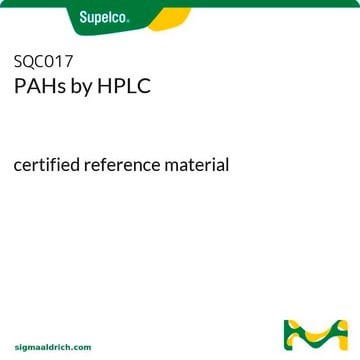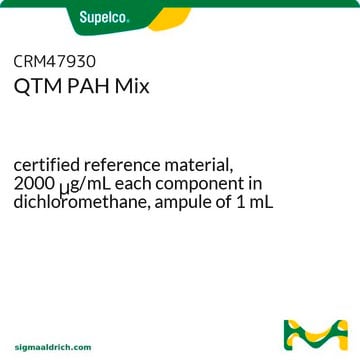About This Item
Kod UNSPSC:
41116107
NACRES:
NA.24
Polecane produkty
klasa czystości
certified reference material
Poziom jakości
Certyfikat analizy
current certificate can be downloaded
opakowanie
pkg of 50 g
producent / nazwa handlowa
RTC CRM170-100
metody
HPLC: suitable
gas chromatography (GC): suitable
Matryca
soil
Zastosowanie
environmental
Format
matrix material
temp. przechowywania
2-8°C
Opis ogólny
This Certified Reference Material (CRM) is produced and certified in accordance with ISO 17034 and ISO/IEC 17025. All information regarding the use of this CRM can be found on the certificate of analysis.
Zastosowanie
PAHs Clay Soil has been used as a certified soil reference material for the quantification of polycyclic aromatic hydrocarbons in soil samples using gas chromatography (GC) technique.
Refer to the product′s Certificate of Analysis for more information on a suitable instrument technique. Contact Technical Service for further support.
Refer to the product′s Certificate of Analysis for more information on a suitable instrument technique. Contact Technical Service for further support.
Ta strona może zawierać tekst przetłumaczony maszynowo.
Analit
Opis
Acenaphthene
Acenaphthylene
Anthracene
Benzo[a]pyrene
Benzo[b]fluoranthene
Benzo[ghi]perylene
Benzo[k]fluoranthene
Chrysene
Fluoranthene
Fluorene
Naphthalene
Phenanthrene
Pyrene
Zobacz wszystko (13)
Hasło ostrzegawcze
Danger
Zwroty wskazujące rodzaj zagrożenia
Zwroty wskazujące środki ostrożności
Temperatura zapłonu (°F)
Not applicable
Temperatura zapłonu (°C)
Not applicable
Wybierz jedną z najnowszych wersji:
Certyfikaty analizy (CoA)
Lot/Batch Number
Przepraszamy, ale COA dla tego produktu nie jest aktualnie dostępny online.
Proszę o kontakt, jeśli potrzebna jest pomoc Obsługa Klienta
Masz już ten produkt?
Dokumenty związane z niedawno zakupionymi produktami zostały zamieszczone w Bibliotece dokumentów.
Rapid extraction method of polycyclic aromatic compounds in soil using basic silica selective pressurized liquid extraction
Titaley AI, et al.
Journal of Chromatography A (2020)
Biljana Milenkovic et al.
Chemosphere, 245, 125610-125610 (2019-12-22)
After NATO bombing of Serbia in 1999, UNEP has identified Kragujevac as one of the four heavily polluted environmental "hot spots". Damaging of industrial and military targets caused the release of substantial amounts of hazardous chemical substances into the environment.
Nasz zespół naukowców ma doświadczenie we wszystkich obszarach badań, w tym w naukach przyrodniczych, materiałoznawstwie, syntezie chemicznej, chromatografii, analityce i wielu innych dziedzinach.
Skontaktuj się z zespołem ds. pomocy technicznej